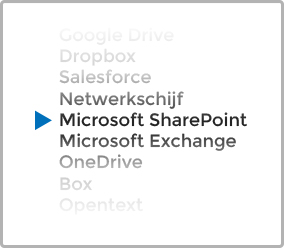There it is, M-Files 2018. The first solution for intelligently unifying and managing information stored in other systems without migration. With M-Files 2018 and the new Intelligent Metadata Layer, information management will never be the same again.
Content
Amount of information increases, while demands also increase
The amount of information that companies need to manage is exploding, while compliance requirements and the need to automate and simplify are also increasing. Existing Enterprise Content Management systems and other traditional methods of managing information do not provide an answer. Information is locked into one-sided, one-size-fits-all systems or it spreads chaotically across multiple separate systems and solutions.
Organisations struggle to effectively manage documents and other information stored in these 'information silos'. As a result, employees cannot quickly find the information they need to do their jobs. Moreover, organisations have so little insight into their information.
Information management of organisations deserves new way of working
Analysts, industry peers and information management experts all agree: organisations need to take a hard look at how they currently handle information.
John Mancini, chief evangelist at AIIM, puts it aptly:
"Information management requires a different approach. Every organisation will take a different path, but the following key assumptions are essential for all: 1) move away from the idea of a world with a single place to store information; 2) user adoptie stimulate with simple, clear interfaces and intuitive tools; 3) understand the importance of metadata."
M-Files makes information valuable and drives innovation
M-Files 2018 and the Intelligent Metadata Layer provide a simple, unified experience for intelligently finding, accessing and managing information. So accessing information that exists within different systems without disrupting existing processes and the users who depend on them. This also eliminates the need for complex and expensive migration projects, two major stumbling blocks to innovation and business process improvement.
M-Files 2018 introduces a new approach called 'intelligent information management' that has prompted analysts, industry experts and all types of organisations to completely rethink their traditional definitions and approaches to managing information. M-Files 2018 marks the end of the myth that 'all content must reside in one system'. The M-Files vision has always been that it does not really matter where information is stored; what matters is the actual information itself, but also what is associated with it and the context that makes it relevant.
The Intelligent Metadata Layer provides a unified entry and user experience to external systems

Users can search and browse without migrating data and without affecting users of the connected system. Information present in external systems can also be enriched with metadata, allowing M-Files to establish relevance and context when searching for information in existing business systems. For example, documents in a network folder or SharePoint, for example, can be classified by type (such as a contract or a proposal) and M-Files links them to other important business objects, such as a customer account in Salesforce or a project or case in an ERP system.
This provides a completely new and dynamic contextual display of information, while keeping information and documents in place and fully accessible to users who do not have M-Files.
Intelligent information management is simple, dynamic and smart. M-Files is the only solution in the world that takes this approach. Wondering what this looks like in practice? Attend the online demonstration of M-Files 2018 at and discover the power and value of intelligent information management.